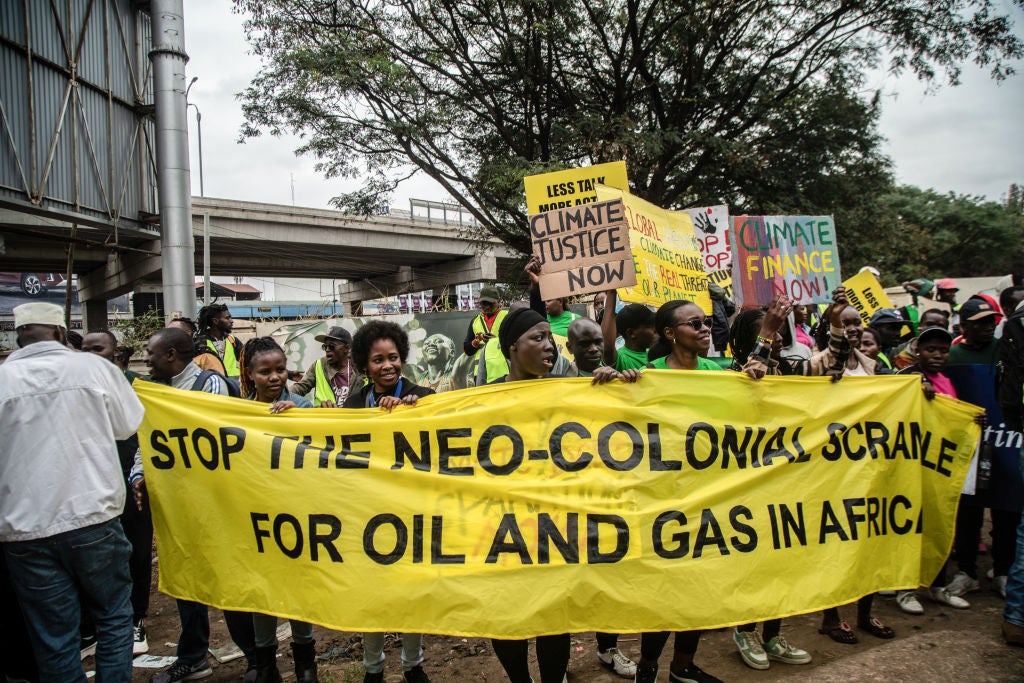
NAIROBI – President William Ruto of Kenya laid out steep objectives for Africa’s inaugural Climate Summit on Monday, as he opened three days of ministerial discussions, talks and panel events.
Some 30,000 delegates are expected to attend the summit, including top US climate diplomat John Kerry, President of the European Commission Ursula von der Leyen, UN Secretary General Antonio Guterres, and a host of African leaders.
“You have entered the future, a future driven by global partnerships committed to African prosperity, inclusive growth and a liveable planet for all of us. This is no ordinary summit,” Ruto said in his opening address.
The wide-ranging speech touched on issues including the disproportionate impact of climate change on the African continent, the critical need for more climate finance and the industrial opportunities presented by the energy transition.
“The reason why possibly we haven’t made much progress is because Africa has not consolidated its ideas when it has brought them to the table,” said Ruto. “I am confident that now, going forward, we will have what it takes to create a win-win outcome in this very intense conversation about climate change.”
Ruto also laid out a bold policy agenda for Kenya, including a target for Kenyans to have access to 100% clean cooking fuels by 2028, and the ambition to achieve a 100% renewable grid by 2030 and a 100GW grid by 2040.

US Tariffs are shifting - will you react or anticipate?
Don’t let policy changes catch you off guard. Stay proactive with real-time data and expert analysis.
By GlobalDataKenya’s grid currently stands at 3GW of capacity and is around 90% renewable, including 45% hydropower and 20% geothermal.
The Africa Climate Summit’s stated aim is to foster “green growth and climate finance”, and much of the discussion on day one focused on the need to scale-up climate finance, as well as the vast economic opportunities that new carbon markets are set to provide African nations.
The summit will reach a climax after three days with a declaration that is set to establish a common position for African nations in future global climate discussions such as COP28 in Dubai.
The declaration is set to call for industrialised countries to accelerate emissions reductions, as well as contain proposals for the establishment of a global carbon tax that proponents argue will increase the availability of climate finance and incentivise countries to decarbonise.
The opening day of the summit was not without its hitches. There was chaos at the conference accreditation centre, with many Kenyan delegates complaining of having to wait up to five hours to receive a pass, as foreigners were ushered to the front.
There was also some confusion as to which African leaders would actually attend, with only the leaders of Burundi, Comoros, Ghana, Madagascar, Malawi and Sierra Leone confirmed to have arrived in the country.
Early September contains a host of other major multilateral events including the Africa Food Systems summit occurring concurrently in Dar es Salaam, as well as the G20 summit in New Delhi and the UN General Assembly in New York.
Early drafts of the Africa Climate Summit schedule that were still circulating on Monday said there would be a speech from the President of Gabon, Ali Bongo, who is among several African presidents to have been deposed in a coup d’etat in recent weeks.
Ghanaian Minister of State for Finance said in a panel discussion at the summit that his country has been struggling to attract interest from foreign investors as a result of the coups and instability witnessed in other West African nations such as Gabon, Niger and Burkina Faso.

Meanwhile, hundreds of climate activists held peaceful protests at Nyayo Stadium in Nairobi, holding placards reading “less talk more action”.
In August, more than 400 African civil society organisations signed an open letter to Ruto, complaining that the conference was pushing a Western agenda.
“Some African organisations that advance a Western agenda have been given a disproportionately huge role in the organisation of the event,” it said. “The result is a Summit agenda that foregrounds the position and interests of the West, namely, carbon markets, carbon sequestration and ‘climate positive’ approaches.”
Ruto himself has been criticised for Kenya’s loosening environmental policy in recent months after lifting a six-year logging ban in July and reversing the previous government’s efforts to mitigate damage to Kenyan forests.
There are also growing concerns about the impacts of new carbon markets in Africa, which both Ruto and Kerry hailed on Monday.
At the conclusion of a segment on carbon markets during his speech, Kerry said that the world “stands on the brink of perhaps the greatest economic opportunity since the industrial revolution”. Others are not convinced, however.
“Historic polluters are looking at Amazon and African forests as [a] source of carbon credits,” said Mohamed Adow, director of energy and climate think tank Power Shift Africa, on Kenyan television. “Instead of cutting emission[s], they see this as a way to buy pollution permit[s].”
Adow argued that African governments are “ceding sovereignty” as they push for new carbon markets, with the African people given only “crumbs” in return.


